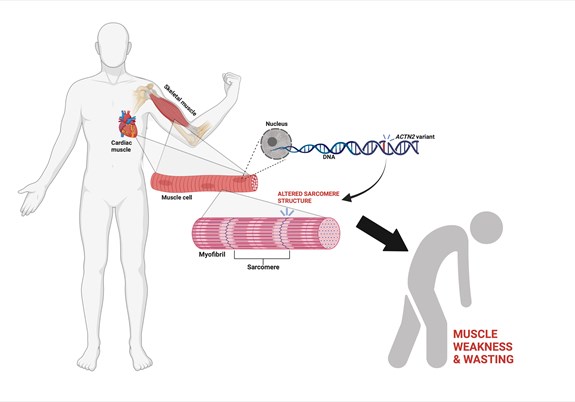Mutation Update for the ACTN2 Gene
The human skeletal muscle system allows us to move and perform various tasks while maintaining balance and posture. More importantly, our heart and lung function largely rely on muscle contraction. However, certain genetic variants may alter the muscle structure or function, causing weakness and wasting over time. Such conditions, known as myopathies, can be very severe, leading to long-term disability. Although rare, in Europe alone, hundreds of thousands of individuals suffer from a muscle disease. In Finland, the number is around ten thousand.

Fig 1. Graphical abstract.
There are several different forms of muscle diseases. Some of the more common types we are better at diagnosing and treating, whereas some of the rarer types are not well understood. Some of these diseases can also closely resemble other neuromuscular disease, which makes diagnosing these diseases more complex. Many myopathy patients remain without a clear diagnosis (e.g., the genetic variant causing their disease is unknown). Thus, these patients are not able to receive a proper estimate of the progress of their disease, for example.
This project aimed at increasing our understanding of a specific type of myopathy, actininopathy, caused by variants in the ACTN2 gene. In the past, ACTN2 was only associated with heart disease. However, as the heart is also a muscle, it was suspected that ACTN2 may be involved in skeletal muscle diseases as well. Recently, this suspicion was indeed confirmed, when the first ACTN2 associated skeletal muscle diseases were found. In this project, to obtain a better overall understanding of the spectrum of ACTN2-related diseases, we collected more than 150 unique ACTN2 variants from literature, databases, and resequencing projects, and estimated how likely each variant is to cause a muscle or heart disease. The evaluation was based on the available patient data, how commonly the variant is seen in the general population, and on the effect of the variant on the molecular level, among other factors.
The results indicate that there is a strong association between ACTN2 variants and skeletal muscle disease, whereas the earlier findings related to heart disease are only supported by limited data. The patient data showed a considerably variable range of symptoms between patients, and thus the researchers were not able to identify any clear hallmarks of ACTN2-related diseases. Hence, the recommendation is that ACTN2 variant interpretation should be performed cautiously, carefully following the guidelines established in the field. The researchers also recommend that patients with ACTN2-related skeletal muscle disease should be regularly seen a cardiologist, as the later development of heart disease cannot be excluded in these patients. Similarly, it is feasible to suspect that in many patients with ACTN2-related heart disease, mild skeletal muscle weakness may be overlooked.
In the case of many ACTN2 variants, it is not clearly understood if they are disease-causing or benign. Currently, the research group is carrying out further studies pertaining the effects of ACTN2 variants on the cellular and molecular level, which can help us to indefinitely determine the clinical impact of these variants. These studies can also help us to increase our understanding of the disease mechanism underlying actininopathies, helping us to provide a definitive diagnosis and better prognosis for the patients.
Mutation update for the ACTN2 gene. Ranta-Aho J, Olive M, Vandroux M, Roticiani G, Dominguez C, Johari M, Torella A, Böhm J, Turon J, Nigro V, Hackman P, Laporte J, Udd B, Savarese M. Hum Mutat. 2022 Dec;43(12):1745-1756. doi: 10.1002/humu.24470. Epub 2022 Sep 27.PMID: 36116040. Review.
